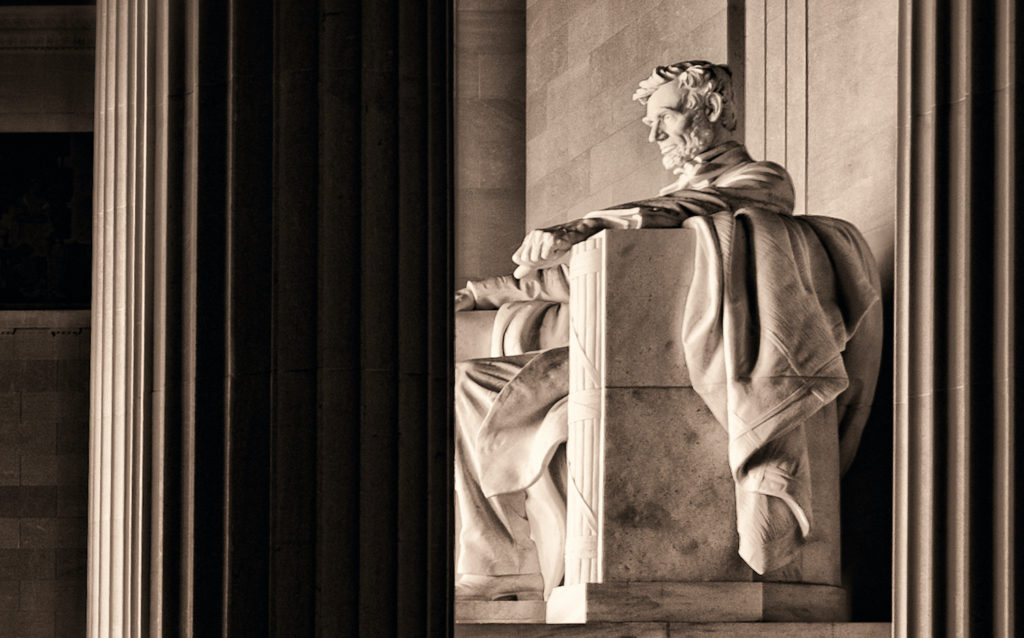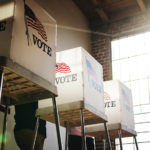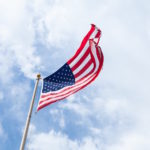The news of the great battle at Gettysburg came to Abraham Lincoln by fits and starts. The rail line into Gettysburg from Hanover, Pennsylvania, had been stopped by the Confederate invasion, and dispatches from the Army of the Potomac had to be taken overland to Westminster, Maryland, before a reliable telegraph connection could relay them to Washington. But when it was finally confirmed on the morning of July 4, 1863, that Robert E. Lee’s Army of Northern Virginia had been forced to retreat, the tidings could not have been more welcome. To a crowd of well-wishers who gathered outside the White House, Lincoln exulted that “the cohorts of those who opposed the declaration that all men are created equal, ‘turned tail’ and run.”
There was less reason to exult as the casualty figures were tabulated and reported. Still, even before the end of July, 1863, plans were already moving forward in Gettysburg for the creation of a majestic national cemetery for over 3,300 of the battle’s Union dead. The featured orator at the ceremonies would be the august Edward Everett. But for the actual dedication sentences—a “few, appropriate remarks,” as David Wills described them in his invitation letter—the organizers turned to Lincoln.
What they expected was probably perfunctory. A little boilerplate, a little sanctimony, and over with quickly. But Lincoln gave them something far beyond their expectations. In 272 terse and simple words, Lincoln laid out the past of the American republic (“a new nation, conceived in liberty and dedicated to the proposition that all men are created equal”), the present (“Now we are engaged in a great civil war, testing whether that nation, or any nation so conceived and so dedicated, can long endure”) and the future (“we here highly resolve that these dead shall not have died in vain, . . . and that government of the people, by the people, for the people, shall not perish from the earth”).
And it was a sensation almost from the first. Charles Sumner believed that Lincoln could not have been more “mistaken” when he suggested that the world would little note nor long remember any of what was said. Sumner wrote: “the world noted at once what he said, and will never cease to remember it. The battle itself was less important than the speech.”
Start your day with Public Discourse
Sign up and get our daily essays sent straight to your inbox.But the very brevity of Lincoln’s “remarks” also left the Gettysburg Address dark with hidden lights. Why the oddly biblical opening (“Four score and seven years ago”)? Why the reach back to 1776 and the Declaration of Independence rather than to 1787 and the Constitution? What would have happened if, in the ensuing two years of the Civil War, we had failed the “testing”?
The least well-examined words of the Address are that expansive triplet, “government of the people, by the people, for the people.” This is not merely a rhetorical flourish. In that triplet, Lincoln lays out three fundamental elements of a democracy. The first is consent—government of the people. Jefferson, in the Declaration of Independence, announced that the “consent of the governed” was the bedrock principle of all natural societies, and the moment that consent failed or was suppressed, people had the right to replace a government with one to which they really did consent. “According to our ancient faith,” Lincoln said in 1854, “the just powers of governments are derived from the consent of the governed.” And that meant plainly “that no man is good enough to govern another man, without that other’s consent. I say this is the leading principle—the sheet anchor of American republicanism.”
The least well-examined words of the Address are that expansive triplet, “government of the people, by the people, for the people.” This is not merely a rhetorical flourish.
A second distinctive of democracy is the people’s voice in the affairs of governing—government by the people. It little matters whether that active voice is the direct participation of individuals, as in ancient Athens, or through their representatives, as in the American Constitution. Lincoln had argued, from his earliest moment in politics, that government by the people’s representatives, through their laws and through elections, and not by mobs with nooses and shotguns or by dictators with whips and chains, was the only legitimate expression of democracy.
Without elections, “we can not have free government,” and any cause that forces their postponement or cancellation “might fairly claim to have already conquered and ruined us.” With them, he reminded Americans in 1861, no rulers can do much harm. “I do not deny the possibility that the people may err in an election,” he conceded, “but if they do, the true cure is in the next election.” Never doubt “that the ballot is stronger than the bullet,” he warned in 1856; and if those ballots be guided by “general intelligence, sound morality, and in particular, a reverence for the constitution and laws,” you will be astonished at what the people can achieve.
The third distinctive of democracy is a government that serves the interests of the people—that is, government for the people—not the interests of a monarch, an aristocracy, or an angry and contemptuous elite, but the inarguable and unambiguous people. For that reason, Lincoln said, government served to do for people those things—but only those things—that need “to be done, but which they can not, by individual effort, do at all, or do so well, for themselves,” like roads and bridges, like schools and asylums, like the enforcement of the laws and the defense of the nation. “Government is not charged with the duty of redressing, or preventing, all the wrongs in the world,” he wrote in 1859 in notes for speeches he would give in Ohio; but it does have the responsibility to prevent any threat to “the Union and liberties of the people,” and to keep from “planting and cultivating too many thorns in the bosom of society.”
Without these three distinctives, you have no democracy.
Lincoln had argued, from his earliest moment in politics, that government by the people’s representatives, through their laws and through elections, and not by mobs with nooses and shotguns or by dictators with whips and chains, was the only legitimate expression of democracy.
Lincoln’s Gettysburg Address was not an explosion of literary fireworks. That kind of speaking was reserved for Edward Everett’s 13,000-word oration, teeming with classical allusions to Thucydides and Pericles, and without a single sentence anyone could remember afterwards. (The journalist John Russell Young, who was on the speakers’ platform with Lincoln and Everett, said that it was “like Greek sculpture—beautiful but cold as ice”). Lincoln’s Address was a hugely concentrated essay on why the American democracy had been founded, why it was worth sacrificing to preserve, and what we could anticipate if it emerged whole from the conflict. It would be “a new birth of freedom,” like the new birth revival preachers had exhorted people to embrace, a revitalization of the original purpose of the American Founding that would “turn this government back into the channel in which the framers of the Constitution originally placed it.”
It was this new birth that every generation of Americans since has labored to understand and to promote, and representatives of every one of those generations are buried here in silent refutation of the aristocrats and the “incapability of the people to govern themselves.” They represent every American war since 1863, and like those over whom Lincoln spoke, they include the rich and poor, educated and illiterate, young and old.
There are Americans here whom Lincoln never lived to meet, but whom he would have instantly recognized as being of the same democratic faith: Paul Heller, Co. K, 3rd Battalion, 5th Marines, who was killed on Guadalcanal on October 8, 1942, who lied to a recruiting officer about his real age so that he could enlist, and who died seven months shy of his sixteenth birthday. . . . Clairus Riggs, who enlisted on January 5, 1943 in Altoona and who died on a landing-craft ramp on Omaha Beach, the sixth of June, 1944. . . . Jacob Hankey, Gettysburg College, Class of 1861, who enlisted in the 138th Pennsylvania Volunteers in 1862, and then won a commission on March 7, 1864 as a white officer in the 43rd United States Colored Troops.
But we today are not sure, in these troubled and turbulent times, whether we are still equal to saving democracy—whether the forces of foreign authoritarianism or domestic disenchantment have rendered that democracy something, instead, to be (as Lincoln once said, in anger) “assailed, and sneered at, and construed, and hawked at, and torn, till, if its framers could rise from their graves, they could not at all recognize it.”
And well may we wonder. But we cannot merely wonder, as though the demise of democracy—the demise of the consent of the governed, the demise of the voice of the people, the demise of human flourishing—is something to which we are only spectators. “The fiery trial through which we pass will light us down in honor or dishonor to the latest generation,” Lincoln said in his annual message to Congress in 1862, “We, even we here, hold the power and bear the responsibility.” As on this spot 159 years ago, Lincoln reminds us that it is we who must dedicate ourselves, we who must highly resolve, we who must decide if a democracy can survive the forces that despise and detest it.
Lincoln’s Address was a hugely concentrated essay on why the American democracy had been founded, why it was worth sacrificing to preserve, and what we could anticipate if it emerged whole from the conflict.
We must not shake our heads at the echoes of past eloquence and wonder why we hear so little of it in our own ears, but instead we must take Lincoln’s words and repeat them, until they become our words, and become our children’s. Shakespeare said, in Henry V, of the battle of Agincourt, “This story shall the good man teach his son,” so that the memory of that “band of brothers” would be heard “from this day to the ending of the world.” And we must do the same, here, on the ground of our American Agincourt, our American Waterloo.
Take Lincoln’s words, then, so that we will remember to speak frankly about what we consent to, and what we do not; take them, so that we march, not to hangings and burnings, not to cancellations and silencing, but to public forums and to ballot boxes, those altars of democracy; take them, so that our first concern is not for our own self-interest, but for the good of every poor man we see rummaging in a Gettysburg alley for tin cans to sell, for every poor woman who crouches on a Gettysburg doorstep in fear of domestic abuse, for every Gettysburg child who needs to know that his or her primary and most precious identity is that of citizen of the American republic.
Armed with that resolve, we will not only have found our way back to Lincoln, back to the Continental Army shivering in the snows at Valley Forge or overturning an empire at Trenton and Yorktown, back to 1942 and 1944 at Guadalcanal and D-Day, back to the 43rd United States Colored Troops. We will have found our way back to democracy itself, to the dignity of a human form that can stand upright before its Creator, with no autocrat or prince casting an intervening shadow, with hands outstretched to Nature and Nature’s God, and to each other. And when we do, the shades of those whom Lincoln honored here will embrace us, as the sun shines once again on government of the people, by the people, for the people.
Delivered at the Soldiers’ National Cemetery on the occasion of Dedication Day, November 19, 2022














